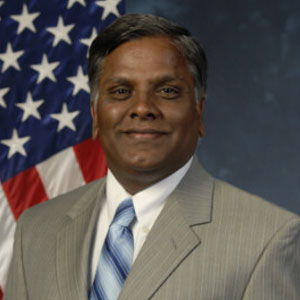Dr. Sam Sambasivam Strives to Inspire Gen Z Cybersecurity Learners
 As chair of the Computer Science in Data Analytics program, Dr. Sam Sambaivam is always brainstorming ways to help his students identify key issues in the field. Last fall, he codified those ideas at the annual Computing Education + Information Systems Applied Research Conference in his paper “Exploring the Strategies Collegiate Cybersecurity Instructors Need to Maximize Engagement of Generation Z Cybersecurity Learners” (the paper was subsequently published in partnership with Dr. Jeffrey Rice, Associate Professor and Director of Cybersecurity and Computer Science at Olivet Nazarene University).
As chair of the Computer Science in Data Analytics program, Dr. Sam Sambaivam is always brainstorming ways to help his students identify key issues in the field. Last fall, he codified those ideas at the annual Computing Education + Information Systems Applied Research Conference in his paper “Exploring the Strategies Collegiate Cybersecurity Instructors Need to Maximize Engagement of Generation Z Cybersecurity Learners” (the paper was subsequently published in partnership with Dr. Jeffrey Rice, Associate Professor and Director of Cybersecurity and Computer Science at Olivet Nazarene University).
Dr. Sambasivam is passionate about this generation of students, but he is concerned that they are growing increasingly disenchanted with higher education. His research found that, unlike other generations that believed higher education was a mandatory step in their professional evolutionary path, many members of Gen-Z are beginning to view it as optional, particularly because they believe cost outlay may not be offset by future salaries. As a result, there is a shortage of cybersecurity professionals in the industry, and thus universities like Woodbury play a critical role in educating GenZ learners to fill these positions. With his partner Dr. Rice, Dr. Sambasivam seeks to understand what motivates GenZ students and how to retain them in cybersecurity programs.
Dr. Sambasivam says one thing his team discovered is that “with overflowing access and a lifelong immersion in technology, GenZ learners do not want to wait until they graduate to experience the real-life application of their education. They want to feel like their contribution to the field makes a difference; that they matter.” More than anything, however, they “want an instructor that cares about them as an individual.”
Woodbury University, he found, is particularly well-suited to meet these needs because of its smaller size and low teacher-to-student classroom ratios. He suggests establishing touchpoints to meet the social-emotional needs of GenZ students, forming relationships, and providing a friendly learning environment. Fieldwork is also key. Computer science data analytics programs should introduce students to real-life activities and situations, he said, “piquing their interest and demonstrating where future graduates are most needed.”
Last Updated on February 16, 2023.